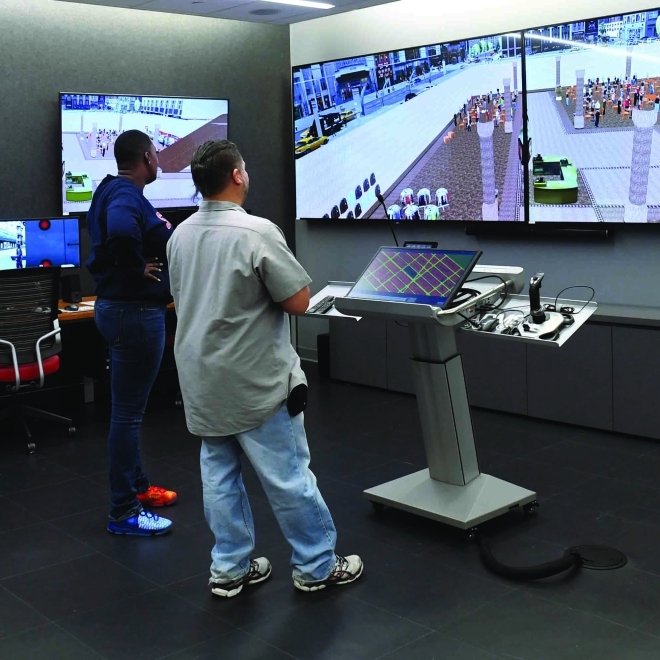Homeland Security & Criminal Justice Leadership: Master Dual Program

In today’s dynamic landscape, a career in homeland security and criminal justice leadership is a responsibility—a dedication to safeguarding communities and upholding equity. A cornerstone of meeting this responsibility lies in an understanding of both homeland security and criminal justice leadership, the discipline in which encompasses unique insights and challenges that demand specialized knowledge and skills. Homeland security demands a keen understanding of cybersecurity, counterterrorism, and emergency preparedness, while criminal justice leadership focuses on enforcing laws and ensuring equitable justice for all.
Despite their distinct focuses, homeland security and criminal justice leadership are closely interwoven, sharing common goals of maintaining public safety and security. A deep understanding of both disciplines— and how they intersect—is pivotal to building your career in these fields.
At St. John’s University, we recognize the interconnectedness of these fields. Our master’s program in Homeland Security and Criminal Justice Leadership seamlessly integrates the strengths of both disciplines, offering you a comprehensive education that prepares you for diverse career opportunities. By delving into each discipline separately before exploring their intersections, you gain a nuanced understanding of the complexities at play.
The Distinction between Homeland Security and Criminal Justice Leadership
Criminal Justice Leadership
Criminal justice leadership, on the other hand, centers around enforcing laws, maintaining order, and administering justice within communities. This discipline encompasses law enforcement, corrections, the court system, and related institutions, emphasizing principles of fairness, accountability, and due process.
Homeland Security
Homeland Security has a primary focus on protecting the nation from external threats. From the complexities of counterterrorism operations to the meticulous planning of cybersecurity measures, professionals in this field operate at the forefront of safeguarding national interests. Homeland security encompasses a broad spectrum of challenges, including border security, emergency preparedness, and critical infrastructure protection.
Where Homeland Security and Criminal Justice Leadership Intersect
The intersection of homeland security and criminal justice leadership is not merely theoretical; it manifests tangibly in our communities every day. Consider this scenario: law enforcement agencies receive intelligence indicating a potential terrorist threat targeting a major metropolitan area. In response, homeland security professionals collaborate with local law enforcement leaders to assess the threat, gather additional intelligence, and develop a coordinated response plan.
As the investigation progresses, criminal justice leadership becomes increasingly complex. Prosecutors and judges weigh in on legal matters, such as obtaining warrants for surveillance or making arrests. Correction officers may be tasked with monitoring individuals under suspicion, ensuring compliance with court orders, or managing any resulting detainees. Throughout this process, communication and collaboration between homeland security and criminal justice professionals are essential to ensure that legal standards are upheld while effectively addressing the security threat.
The intersection of these fields extends beyond crisis response scenarios. Routine law enforcement activities, such as traffic stops or investigations into organized crime, often yield valuable intelligence relevant to homeland security efforts. Conversely, insights gained from counterterrorism operations or cybersecurity investigations may inform criminal justice strategies for combating emerging threats. By recognizing and leveraging these commonalities, professionals in both disciplines can maximize their effectiveness in protecting communities and upholding the rule of law.
Why Should I Study Both?
Embarking on the study of both homeland security and criminal justice leadership enriches your career path. Gaining expertise in these complementary fields positions you as a versatile leader adept at addressing a wide range of security challenges with confidence and efficacy. A multidisciplinary education provides you with a holistic understanding of security dynamics, from external threats to internal vulnerabilities. By delving into the intricacies of homeland security, you gain insights into geopolitical dynamics, emerging technologies, and risk assessment methodologies.
Exploring criminal justice leadership provides a deeper understanding of law enforcement, judicial processes, and community engagement strategies. Professionals with dual expertise are well-equipped to navigate the complexities of today’s security landscape, whether they pursue careers in government agencies, law enforcement, private security firms, or nonprofit organizations. By leveraging their combined knowledge and skills, they can make significant contributions to enhancing public safety, protecting individual rights, and fostering resilience in the face of evolving security threats.
That’s why St. John’s Master’s in Homeland Security and Criminal Justice Leadership is so unique. By recognizing and addressing the unique aspects of this field, we aim to equip students with the skills to emerge as highly proficient leaders in this dynamic discipline.
Here are some of the courses you can take as a student in this program:
- Applied Seminar in Leadership Practicum
- Contemporary Legal Problems in Criminal Justice
- Court Administration and Leadership
- Criminal Justice Policy Formation and Analysis
- Criminological Theory
- Critical Issues in Correctional Administration
- Ethical Leadership: Principles and Practices
- Issues in Global Security
- Leadership in Public Administration
- Leadership Issues in Critical Incident Management
- Organizational Behavior
- Organizational Development
- Police and Homeland Security Management
- Police Leadership: A Global Perspective
- Selected Topics: Criminal Justice
- Seminar in Global Terrorism
- Seminar in Stress Management
- US Constitution and Homeland Protection
You can see from the breadth of the offerings that we aim to foster leaders in both these sectors. With our comprehensive curriculum, expert faculty, and focus on practical application, we aim to unlock your full potential so you can make a meaningful difference in the world.





